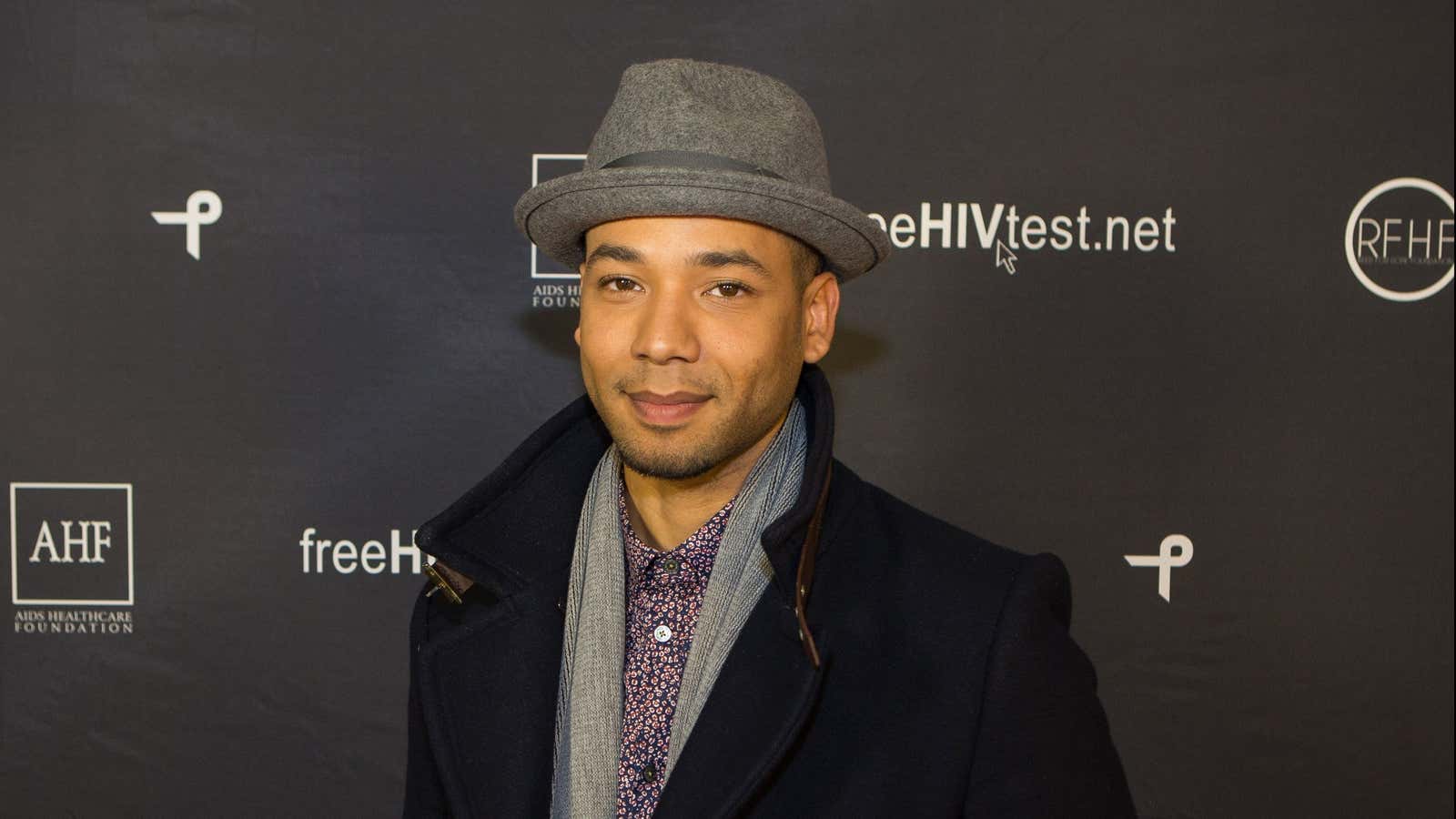Jussie Smollett, an actor working in the cast of Fox’s series Empire, was charged today (Feb. 20) with staging a hate crime against himself.
Just weeks ago, he became a symbol of the prevalence of hate crimes in the US, after he reported that two attackers wrapped a noose around his neck and poured bleach on him, yelling “MAGA country!” in reference to Donald Trump’s Make America Great Again slogan.
But since suspicions emerged last week that Smollett might have staged the crime himself, his case has instead been touted by right-wingers as evidence for what they say is a relentless liberal campaign to besmirch Trump.
The fact that Smollett faked the assault is despicable, as his critics have pointed out. But that doesn’t change the grim reality that real hate crimes are dramatically more common than hoaxes. The focus on his case is drawing attention away from that problem, and probably making it harder for future victims to be believed when they report crimes.
So what happened?
Smollett’s initial report of the hate crime was met with widespread support, including by politicians and public personalities. “This was an attempted modern-day lynching,” commented Democratic presidential hopeful Kamala Harris on Twitter. Cory Booker, another Democratic candidate, used similar words to describe the attack, and Smollett supporters organized in a rally in New York City to condemn violence against LGBTQ people and people of color. (The actor is half African-American and openly gay.)
On Feb. 13., two Nigerian bothers, Olabinjo and Abimbola Osundairo, were arrested as suspects in the assault. They were released two days later with the charges against them dropped, raising doubts on the actor’s account.
The two brothers—who had both worked as extras for Empire, one even being Smollett’s trainer for a short period—later told the police that the actor had paid them to stage the assault, allegedly because he wanted a stronger reaction to a racist letter he had received, unnamed sources told CNN. On Feb. 16, the Chicago Police Department (CPD) said that the new information acquired in the case “shifted the trajectory of the investigation” and asked to meet Smollett, who did not agree to meet with prosecutors. Then, tonight, the actor was officially charged with staging a crime, although his lawyer says he is innocent.
The reactions
Even before the charges were filed, many who originally supported him, from author Roxanne Gay to rapper Cardi B, had started to doubt the actor’s account. Others were more cautious, including Booker and Harris, who both said they would wait for police information to comment further. Director Ava DuVernay, meanwhile, said the CPD’s poor track record when it comes to racist bias should at least grant Smollett the benefit of the doubt.
But there was a distinct group of commentators who said they were certain the attack was a hoax—and they seemed thrilled about it. Trump supporters and conservative commentators, including Donald Trump Jr, directed a storm of angry tweets at Smollett, accusing him of orchestrating the attack to defame Trump, and the mainstream media of promoting “victimhood culture“. Even more moderate voices within the Republican party, such as former UN ambassador Nikki Haley’s, condemned those who believed the alleged victim.
Some critics demanded that Smollett be tried for a hate crime against white people. Rightwing journalist Andy Ngo, meanwhile, tweeted a list of about 30 hate crimes committed between 2016 and 2018 that turned out to be hoaxes.
The hate is real
Paradoxically, however, Ngo’s tweets and the rightwing rush to make Smollett’s case emblematic, show exactly why it should not be: They display a dangerous tendency to doubt hate crimes, and minimize their pervasiveness—focusing the attention instead on the ones that turn out to be made up.
There is no definitive database of hoaxes, but research suggests they are an abysmally small percentage of hate crimes. Brian Levin, the director of the Center for the Study of Hate and Extremism at California State University in San Bernardino, who has been tracking staged and real hate crimes, counted 49 fake reports between 2016 and 2018. In the same time, Levin told Quartz, there were about 21,000 hate crimes. That makes the percentage of falsely reported attacks 0.2% of all hate crimes. (The FBI received 13,000 hate crime reports in 2016 and 2017, according to its latest data.)
While Levin concedes that his data collection methodology has limitations—he and his team rely on media reports—it is indicative of how rare it is for a hate crime to be made up.
This is especially true since the number of hate crimes has risen significantly in the past four years, and as Levin noted, are at a decade high in many large US cities. Black people are the most common targets.
This is consistent with a rise in number of hate groups which has occurred during the same period, primarily due to a growth in anti-minority, white supremacist groups.
Focusing so much energy on hoaxes when they aren’t but a small fraction of total hate crimes is akin to the anti-feminist impetus of highlighting the few cases of sexual assaults that are misreported—2% to 10%—even though they are only a small share of rapes and assaults reported to the police.
Like the obsession with fake rape allegations, the one with fake hate crimes has the same result: discrediting the victims. It made sense to take Smollett’s words at face value, even though those who did might be proven wrong this one time.
It’s simple statistics: The chance of a hate crime being real is exponentially higher—99.8% vs. 0.2%, according to Levin’s data—than it being a hoax.
Correction: The hate crimes in large US cities are at a decade high, not an all-time high.
